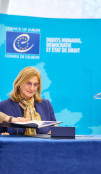Vice-President of the European Commission Margaritis Schinas participates in the Meeting of the Ministers of Foreign Affairs of the Council of Europe

The foreign ministers of the 46 countries are in charge of setting the organisation’s policy directions. One of the main issues discussed in this year’s Ministerial Meeting was the ongoing war in Ukraine. The ministers recalled their dedication to supporting Kyiv for as long as needed. They discussed the importance of the Register of Damage, a mechanism to keep Russia accountable and a first step in providing compensation for the victims of the war. They also welcomed the work underway in establishing an international tribunal for the crime of aggression. The ministers also agreed on the direction to take in other areas, ranging from the environment and migration to human trafficking and the protection of journalists. One of the most significant achievements of the Ministerial Meeting was approving the Framework Convention on Artificial Intelligence, which represents the first international agreement on the matter. It will be open for signature in September in Vilnius, Lithuania, as part of the country’s Presidency of the Council of Europe’s Committee of Ministers. In addition, the Ministers adopted both a report and decisions, while the presidency delivered a declaration, which was supported by a majority of the Member States.
During the Ministerial Meeting, the European Commission Vice-President for Promoting our European Way of Life, Mr Margaritis Schinas, represented the EU. The Vice-President made an intervention in which he reiterated the EU’s commitment to supporting Ukraine. He also recalled the EU’s willingness to strengthening its strategic partnership with the Council of Europe, for the continent to act as an anchor of stability in these challenging times. He also stressed the importance of the inter-institutional cooperation for the EU’s enlargement, and reminded of Brussel’s commitment to becoming a party to the European Convention of Human Rights.
The session of the Committee of Ministers was preceded by the youth event “Confidence in Tomorrow” from 14 to 16 May, which sought to mark the 75th anniversary of the institution and to promote the vital relationship between the Council of Europe and young people. The goal of this event was to provide young people and youth civil society with a stage for them to share their ideas on strengthening democracy and involve them and their perspectives in the work of the Council of Europe. The youth event culminated in a commemorative ceremony at the Opéra national du Rhin in the presence of the ministers of the Member States, the Council of Europe leadership, and other high-level guests. The ceremony also marked the official opening of the 133rd Session of the Committee of Ministers. The Secretary General of the Council gave a speech, along with the President of the Parliamentary Assembly, the Foreign Ministers of Germany and Liechtenstein, and representatives of the youth. The speeches were followed by a concert by the Sinfonieorchester of Liechtenstein.










